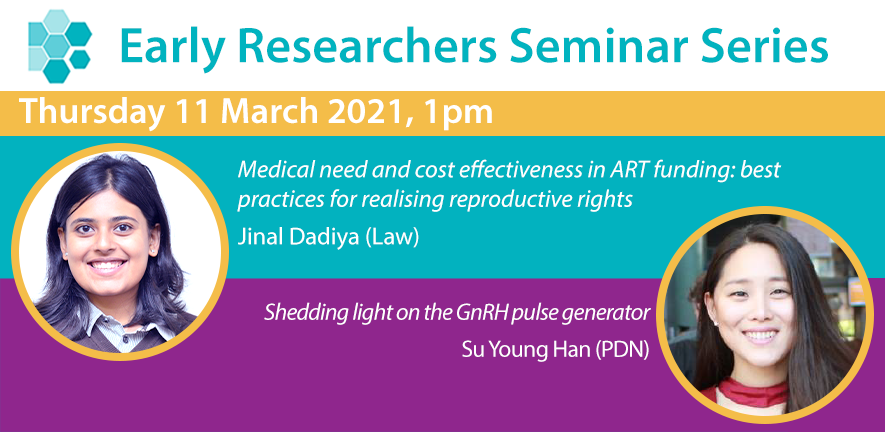
Thursday 11 March 2021, 1pm - 2pm
Shedding light on the GnRH pulse generator
Su Young Han (PDN)
Medical need and cost effectiveness in ART funding: best practices for realising reproductive rights
Jinal Dadiya (Law)
Chair: Dr Rumiana Yotova (Law)
The Early Researchers Seminar Series (ERSS) is a platform for PhD Students and early career researchers (ECRs) at the University of Cambridge with research foci on reproduction to share and discuss their research with other academics from a range of disciplines also researching reproduction at the University. Seminars are held on Zoom on the second Thursday of every month, 1pm - 2pm. For more information, and for the full 2020 - 2021 programme, please see the main ERSS page.
Speakers and abstracts
Shedding light on the GnRH pulse generator
Su Young Han (PDN)
The gonadotropin-releasing hormone (GnRH) neurons, the key cells regulating fertility in all mammals, release GnRH in an episodic manner. This drives pulsatile secretion of gonadotropins critical for gonadal function, although the identity of the neuronal network generating these hormone pulses remains unproven. Evidence support the presence of an extrinsic pulse generator, and attention has focused on a subpopulation of kisspeptin neurons in the arcuate nucleus (ARN). We have used all-optical approaches, including optogenetics and fibre photometry, in genetically-manipulated mouse models to address the role of ARN kisspeptin neurons in GnRH pulse generation. We found that ARN kisspeptin neuron population exhibits synchronized episodes of brief (~1 min) calcium activity, occurring as frequently as every 9 min in gonadectomized mice. These ARN kisspeptin neuron population calcium events were found to be near-perfectly correlated with pulsatile luteinizing hormone (LH) secretion. The selective optogenetic activation of ARN kisspeptin neurons for 1 min generated pulses of LH in freely behaving mice, whereas 30-min inhibition with archaerhodopsin suppressed LH pulsatility. The resetting of the ARN kisspeptin neuron activity with halorhodopsin were found to reset ongoing LH pulsatility. These observations suggest that the ARN kisspeptin neurons are highly likely to be the long-elusive hypothalamic pulse generator driving fertility in mice.
Su Young Han is a Postdoctoral Research Associate in the Department of Physiology, Development and Neuroscience at the University of Cambridge. Su studied Physiology for her undergraduate and Doctoral degrees at the University of Otago in New Zealand. After completing her PhD in 2013, Su joined Professor Allan Herbison’s laboratory at the Centre for Neuroendocrinology at the same university. Su has been continuing to work with Professor Herbison, now at the University of Cambridge since 2019. Su’s research focuses on understanding the mechanisms underlying the synchronised activity of arcuate nucleus kisspeptin neurons, the pulse generator of gonadotrophin-releasing hormone and luteinizing hormone, using variety of optical tools including in vivo optogenetics and fibre photometry.
Medical need and cost effectiveness in ART funding: best practices for realising reproductive rights
Jinal Dadiya (Law)
Affordability is an element of the international human right to reproductive health under the International Covenant of Economic, Social, and Cultural Right. This includes affordable access to assisted reproduction, which, in some states, is established through government funding and price regulation. I compare ART funding frameworks across four jurisdictions to identify best practices for realising the right to reproductive health. My findings show that similar themes and considerations influence funding frameworks across regulatory systems. Significant among these are the interrelated considerations of medical need and cost-effectiveness. I claim that medical need-based considerations are sometimes unreliable, and result in discriminatory access to ARTs. It is argued that an overemphasis on medical need is inconsistent with the right to reproductive health. This paper also concludes that while resource limitations make cost-effectiveness calculations important, they are not always harmonious with the right to reproductive health. It recommends a reproductive health based approach to considering cost-effectiveness in ART funding policy.
Jinal Dadiya is a PhD Candidate at the Faculty of Law, University of Cambridge and is member of the Centre for Law, Medicine, and Life Sciences. Her doctoral research focuses on how fertility markets should be regulated for efficacious realisation of the right to reproductive health. Her project uses a combination of the comparative human rights and regulatory studies approaches. Prior to this, she did the BCL at the University of Oxford and worked in the government affairs practice of a leading Indian law firm.



